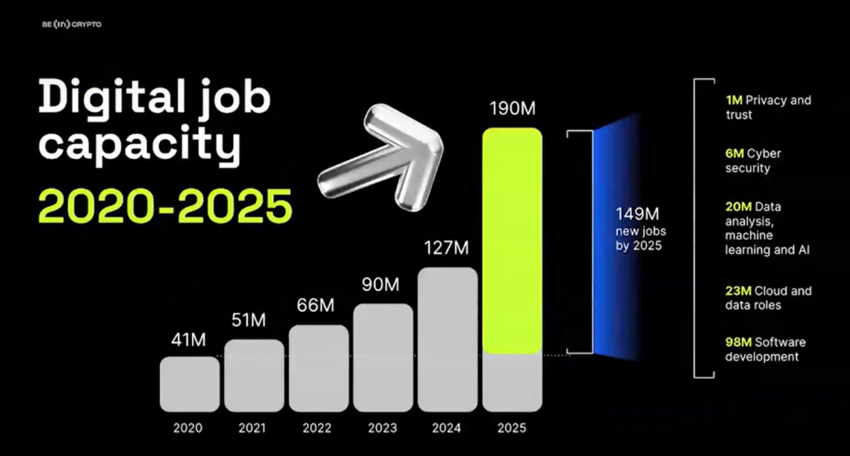Web3 vs. traditional tech: which path is more your style? While both career paths operate within the tech sphere, their technology tools, areas of concentration, industry specifics, and foundational philosophies differ. This article dives deep into these two realms, exploring their unique attributes to help you choose the right career.
In this guide:
- Understanding web3 vs. traditional tech
- Wev3 vs. traditional tech: Key differences and similarities
- Say Goodbye to Post-Interview Rejections!
- Find your dream job 🚀
- Working in web3: Opportunities and challenges
- Working in traditional tech: Pros and cons
- Key considerations for setting your career compass
- Choose carefully: Web3 vs. traditional tech career?
- Frequently asked questions
Understanding web3 vs. traditional tech
Understanding web3 and traditional tech is essential for anyone considering a career in technology. These two career paths embody distinct paradigms that will define the future of the digital landscape.

Wev3 vs. traditional tech: Key differences and similarities
Web3 represents the evolution of the internet, driven by decentralization and blockchain technology. It represents a future where information, transactions, and interactions occur in a transparent, decentralized, and open web, eliminating the need for intermediaries and centralized institutions. Arina Koganelok, HRD at BeInCrypto, highlights the freedom and responsibility that people working on web3 have:
“Freedom to choose goals, the time you devote to them, and a place to work. Responsibility for the clear fulfillment of their promises and goals on time.”
Arina Koganelok, HRD at BeInCrypto
In the web3 domain, smart contracts allow users to execute actions automatically without the power of centralized authorities. Moreover, cryptocurrencies enable P2P value transfer, and decentralized applications (DApps) challenge the dominance of traditional software.
On the other hand, traditional tech represents the foundation of our existing digital world. It encompasses most of the technology that we use nowadays, from operating systems and databases to web and mobile applications. These roles span a wide range of industries, including finance, healthcare, and e-commerce, to name a few.
Web3 vs. traditional tech:
When examining web3 and traditional tech, here’s how their similarities and differences stack up:
- Decentralization vs. centralization:
- Web3: Web3 is characterized by decentralization, where data and control are distributed across a network of nodes. It aims to eliminate intermediaries, creating trustless and transparent systems.
- Traditional tech: Traditional tech relies on centralization, with data and control often concentrated in centralized servers or systems. Intermediaries are common in traditional tech architectures.
- Technology stack and tools:
- Web3: Jobs in web3 typically require expertise in blockchain technologies, smart contract development (e.g., Solidity), and decentralized protocols. Knowledge of cryptocurrency is essential.
- Traditional tech: Traditional tech roles involve working with established technology stacks and languages (e.g., Java, Python) and commonly used frameworks and tools for web and application development.
- Focus on trust and transparency:
- Web3: Web3 emphasizes transparency through blockchain’s immutable ledger. It’s designed to reduce reliance on trust in centralized entities, promoting transparency and security.
- Traditional tech: While security and trust are important in traditional tech, they are often achieved through centralized security measures and trust in established institutions.
- Career landscape:
- Web3: Web3 careers are relatively new and rapidly evolving. The industry offers opportunities for innovation and disruption but also involves a degree of uncertainty.
- Traditional tech: Traditional tech careers have well-established career paths, hierarchies, and job roles. The field offers stability and a broad range of opportunities within established industries.
- Technical skills and problem-solving:
- Web3: Web3 and traditional tech roles both require strong technical skills, problem-solving abilities, and a deep understanding of their respective technology stacks.
- Traditional tech: Traditional tech professionals and web3 developers must be proficient in programming, debugging, and troubleshooting.
Say Goodbye to Post-Interview Rejections!
Find your dream job 🚀
Working in web3: Opportunities and challenges
The web3 industry reached $3.2 billion in 2021 and is set to grow to $81.5 billion in 2030. That means a tremendous expansion and transformation of the job opportunities in both the web3 and traditional tech sectors!

The already high demand for web3 jobs such as blockchain developers, smart contract auditors, and decentralized application (DApp) developers is likely to increase within the industry.
Moreover, traditional tech companies like Microsoft, Oracle, and IBM have invested in blockchain and decentralized technologies. Microsoft, for instance, offers Blockchain-as-a-Service (BaaS) on its Azure cloud platform. These established players seek to integrate decentralized web3 technologies into their existing systems. This will lead to job opportunities for professionals who can bridge the gap between traditional tech and web3.
The demand for these professionals is already present and continues to grow. Despite the exciting opportunities, the industry is still relatively new. It has its own unique challenges, such as a fast-paced and constantly evolving field, lack of established best practices, market volatility, and security risks. Koganelok points it out:
“Now it’s a wild west market. There are a lot of companies, and it needs to be clarified which of them can be trusted and who cannot. Soon, work in web3 will become more civilized, reliable and stable. But at the same time, I am certain that the spirit of personal responsibility and freedom will remain in web3 for a long time.”
Arina Koganelok, HRD at BeInCrypto
Job roles and specializations
The demand for web3 professionals has been steadily increasing, driven by the growing adoption of blockchain technology, decentralized finance (DeFi), non-fungible tokens (NFTs), and other various web3 technologies and applications. Job openings in this field have become highly competitive. Here are the most demanding jobs:
Blockchain developer
Blockchain developers are responsible for designing, developing, and maintaining the blockchain technology to create on-based applications and smart contracts. Depending on the blockchain platform, they work with programming languages like Solidity, Rust, or JavaScript. These professionals may specialize in areas such as Ethereum development, DeFi application development, or blockchain security auditing.
Smart contract auditor
Smart contract auditors review and audit smart contracts to identify vulnerabilities, security flaws, and potential issues. They’re crucial to ensuring the security and reliability of blockchain-based applications. Specializations in smart contract auditing may focus on specific blockchain platforms, token standards (e.g., ERC-20, ERC-721), or DeFi protocols.
Decentralized application (DApp) developer

DApp developers create decentralized applications that run on blockchain networks. They design user interfaces, implement smart contracts, and ensure seamless integration of decentralized apps with blockchain platforms. These experts may specialize in specific blockchain ecosystems (e.g., Ethereum, Polkadot) or focus on DApps for particular industries, such as finance, gaming, or supply chain.
Blockchain architect
Blockchain architects, as the name suggests, design the overall architecture of blockchain solutions, ensuring scalability, security, and performance. They make critical decisions about consensus mechanisms, data storage, and network design. Their role may involve designing permissioned or permissionless blockchains, optimizing for enterprise use cases, or developing cross-chain solutions.
Cryptocurrency analyst
Cryptocurrency analysts track and analyze cryptocurrency markets, tokens, and digital assets. They provide insights on market trends, price movements, and investment opportunities. These analysts may specialize in specific cryptocurrencies, tokenomics, or trading strategies.
Web3 product manager
Web3 product managers oversee the development and launch of web3 applications, ensuring they meet user needs and align with business goals. They bridge the gap between technical development and user experience. Specializations may involve managing DeFi product launches, NFT marketplaces, or blockchain-based identity solutions.
Blockchain security engineer
Blockchain security engineers focus on safeguarding blockchain networks, smart contracts, and decentralized applications from vulnerabilities and threats. They proactively identify and mitigate security risks, conduct security audits, and ensure the integrity of blockchain ecosystems.
Job roles may include expertise in penetration testing, security token offerings (STOs), blockchain forensics, or securing decentralized autonomous organizations (DAOs).
DeFi protocol developer
DeFi protocol developers are responsible for designing and coding decentralized finance protocols and platforms. They create the infrastructure for lending, borrowing, liquidity provision, yield farming, financial systems, and other DeFi services.
These experts may specialize in particular DeFi categories, such as decentralized exchanges (DEXs), stablecoin protocols, algorithmic stablecoins, or yield optimization strategies. They might also work on cross-chain DeFi solutions to enable interoperability of peer transactions between different blockchain networks.
Working in traditional tech: Pros and cons
Navigating an industry shaped by decades of innovation and development has many advantages, making the sector attractive to many professionals. However, it may also come with some complexities too.
Pros
- Job stability: One of the key advantages of pursuing a career in traditional tech is its stability. Established tech companies and industries tend to have a consistent demand for their products and services, providing a sense of job security for professionals.
- Competitive compensation: Traditional tech companies typically offer competitive compensation packages. These packages often include attractive base salaries, bonuses, stock options, and various benefits.
- Resource accessibility: Professionals working in traditional tech can access extensive resources and infrastructure, including data centers, cloud services, and development tools, which can expand the knowledge and skillset of these experts.
Cons
- Skill redundancy: In traditional tech, it’s important to keep skills up to date. Technology changes quickly, so these professionals need to learn the newest programming languages, tools, and methods to avoid falling behind.
- Work-life balance: The tech industry is known for its demanding work culture. Professionals in traditional tech roles may encounter long working hours, tight deadlines, and the potential for an impact on work-life balance. At times, maintaining a healthy equilibrium can be challenging.
Key considerations for setting your career compass
You’ll want to weigh several crucial points to determine the best fit for you, whether it’s the tried-and-true realm of traditional tech or the pioneering landscape of web3. Your decision will shape your professional journey, so take the time to align it with your aspirations and interests.
Set salary expectations
Before diving into a career, it’s essential to research and understand the salary expectations associated with different roles and industries. Factors like your location, experience, and the industry you’re entering can influence your earning potential. Make sure your chosen career aligns with your financial goals.
The crypto and web3 industry has experienced significant growth, and professionals with specialized skills in blockchain development, DeFi, NFTs, and related areas may have the potential to earn slightly better income. However, traditional tech often offers consistent and competitive salaries with more secure and predictable income.
Working style and work-life balance

Considering lifestyle and personal commitments is perhaps the most important aspect of this list. Some tech roles and web3 projects may require long hours and high-intensity work, while others offer more flexibility. Consider that, as it can heavily impact your personal and professional life.
Personal interest and passion
Many of us spend most of our waking hours dedicated to our jobs. So, it’s of course preferable to spend that time working on things that we’re passionate about and that bring excitement.
The web3 industry is a disruptive and innovative field yet is relatively young. That might invite professionals who enjoy experimentation and being part of something with great potential. On the flip side, traditional tech is likely more of a natural fit for those looking for stability and well-established technologies. That doesn’t mean that traditional tech is boring, and can’t be innovative in its own right. But web3 attracts a certain type of passionate, future focused professional
Future industry trends
Staying ahead in your career requires monitoring future trends, especially in technology fields. As you consider a career in web3, ensure to stay updated on the evolving trends within the blockchain and crypto space. Traditional web and tech trends may include cloud computing technology, AI, machine learning, cybersecurity, and so on.
Choose carefully: Web3 vs. traditional tech career?
Choosing the right career path is a big decision. The web3 industry is like an exciting expedition into blockchain, cryptocurrencies, and DApps. It’s full of innovation and risks. Traditional tech, on the other hand, is akin to building on solid foundations, working with established technologies, and navigating well-charted waters.
Ultimately, your career path hinges on your passions and aspirations. If cryptocurrencies, web3, and blockchain technologies excite you, then web3 might be your bread and butter. On the other hand, if you’re after stability, a diverse tech palette, and a structured trajectory, then traditional tech could be for you. In the end, it’s vital to follow your instincts and to follow what you stand for at your core. Good luck!
Frequently asked questions
Are web3 jobs in demand?
What is the career scope of web3?
What do I need to know to work in web3?
Does web3 pay well?
What is the difference between web3 and the traditional internet?
Is web3 part of tech?
Disclaimer
In line with the Trust Project guidelines, the educational content on this website is offered in good faith and for general information purposes only. BeInCrypto prioritizes providing high-quality information, taking the time to research and create informative content for readers. While partners may reward the company with commissions for placements in articles, these commissions do not influence the unbiased, honest, and helpful content creation process. Any action taken by the reader based on this information is strictly at their own risk. Please note that our Terms and Conditions, Privacy Policy, and Disclaimers have been updated.




